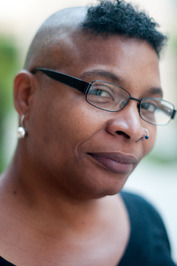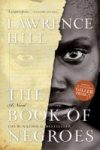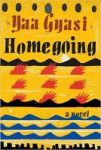
Author Nalo Hopkinson, whose best-known book, Brown Girl in the Ring, is neither historical nor contemporary, but takes place in a dystopian future Toronto (read it!)
If there’s one thing I’m proud of, it’s not bragging. Haha! On this blog, I have made a point of not saying I’m an expert in anything, or thinking I can give advice to you, the readers. Mostly I try not to say “you” because it automatically sounds preachy. So I talk about myself a lot and “you” get to hear, “Me, me, me!” Maybe not ideal, either.
I was trying to think of what to write about Black Lives Matter. I thought smugly to myself, “I can write about Black authors and books, because I’m always up to date on that!” I imagined I must have read about 50 books by Black authors in the last 10 years, and a good smattering of the classics before that.
But my Goodreads account does not lie. I have actually only read 33 books by Black authors in the past 13 years, since I created the account. During that time, 2006 to 2019, I read almost 700 books, so that’s less than 5% Black content.
Why should I have read more Black literature?
- When I was growing up, my school had two Black and two Biracial children out of about 600 students.
- For 75% of my life, I have lived in a community “next door” to a group of historic Black communities. I have learned about the history of my neighbours and I care about their lived experiences and their rights.
- Historically, the communities did not mix. This was attributed to the Black communities wanting to keep to themselves, when of course it was because the white communities practiced exclusion. Things are changing; I would estimate that about 15% of the households in my neighbourhood are Black families now.
- My town has a history that includes anti-Black racist incidents, especially in schools, and a demonstrated failure to address the needs of Black students. Parents in my area try to buy homes in school catchment areas that have a higher percentage of white students.
- My town uses subtle, systemic racism to exclude Black people. For example, we are building plenty of soccer fields and hockey rinks, but no new basketball courts. Why? Because white homeowners are afraid Black youth who play basketball will start hanging around “their” parks and playgrounds.
- For 6 years, I worked in a branch library that was specifically intended to serve local Black communities. While there, I had easy opportunities to work with Black organizations and individuals to promote Black literature, culture and achievements, and to address injustice. I learned a lot.
- My eyes were opened to the everyday experiences of my Black co-workers, who were incessantly monitored and followed in stores, stopped by police for “driving while Black”, mistaken for being suspects in crimes, and assumed to be uneducated or living in poverty.
- I want to be part of a world that values all people, without putting a priority on white lives and experiences. In a better world, I would have more Black friends and colleagues, but that is not going to happen unless my circles (work and personal) become intentionally inclusive, instead of just waiting for it to happen by itself. How could it? I have work to do.
- I took a life-changing Anti-Oppression workshop which began my education about colonialism and its effects in the present day. I am still educating myself about intersectionality.
And that is where reading comes in. Reading is a way of relating to the world that feels comfortable to me. I can absorb the experiences of Black authors, Black characters and Black events, contemplate them, internalize them, and gain empathy. I can learn about history and what’s happening now, through individual voices and over wide swaths of time. Reading fiction makes things alive for me, maybe even more than television and movies and news.
I do have to force myself to watch more news than I would otherwise choose. If I don’t, it is too easy to stick my head in the sand and say it’s overwhelming, stopping with a dry reading of the facts. Sometimes you have to watch the video.
I am grappling with how I go beyond media consumption. I have to be realistic – my sphere of influence is actually quite large. I can’t pretend that poor little me is powerless to change anything. If older white women like me threw their weight behind real social change, it would gallop in.
I can’t always stay home with my nose in a book.
But when I do…here are some Black authors and books that have made a difference for me.
Classics
I Know Why the Caged Bird Sings – Maya Angelou
A Raisin in the Sun – Lorraine Hansberry
Sister Outsider – Audre Lorde
Strength to Love (also published as A Gift of Love) – Martin Luther King Jr.
either: The Collected Poems or The Selected Poems of Langston Hughes – Langston Hughes
Historical
The Book of Negroes – Lawrence Hill (published in the US as Someone Knows My Name. This is why.)
Small Island – Andrea Levy
Homegoing – Yaa Gyasi
Things Fall Apart – Chinua Achebe
The Color Purple – Alice Walker
Contemporary
Queenie – Candice Carty-Williams
The Hate U Give – Angie Thomas
Americanah – Chimamanda Ngozi Adichie
Girl, Woman, Other – Bernardine Evaristo
Becoming – Michelle Obama
My Black fiction and nonfiction lists on Goodreads are here and here.
Knowing that real-life relationships and experiences are best, how does reading rate for you as a means to change your world view? How does reading compare to news, movies, TV, podcasts, etc. – for you?
As always, I would love to get your reading recommendations.
















I wholeheartedly agree that fiction can often really introduce and immerse you in a completely different world. I’ve enjoyed Becoming (though I think got less appealing in the third act), The Hate U Give, An American Marriage, Such a Fun Age and Born a Crime. I’m interested that I’ve read these with no great “black lives matter” intentionality. But I have largely bought not borrowed these books due to circumstances (travelling, corona, gifts). And I feel richer for reading them.
I’ve also read the more academic Black Emu which has had some serious opposition or questioning, but that’s radically changed the story of the indigenous Australians pre settlement, compared to the common school curriculum.
Circling back to me buying not borrowing from the library, it means I pass on books, usually go my family. I enjoy being able to nudge their reading, though we largely align on views.
None of this is to say I’m beyond reproach! My boyfriend calls out some of my language, and I’m glad he has the courage to. I need to do better.
It’s good that the quality of the books speaks for itself. I’ve been selecting novels for my mom from the library for the past 2 years or so. I have been able to tweak her tastes a lot! – towards more multicultural fare. It’s not that she didn’t want to read it before, but more diverse reading rarely crossed her path when exchanging books with her friends. We’re now able to discuss books we’ve both read, more often.
Dark Emu is on my shelf waiting for me. I must get into it. I read a good review of it only last week.
I believe reading can change one’s world view. And it does. I read Stan Grant’s first autobiography, about 20 years ago. He’s a journalist, worked for CNN. He’s indigenous.
Your post has made me think of the fiction and non-fiction by Indigenous authors. I do need to read more.
Too Much Lip by Melissa Lucashenko was a novel that challenged some of my views. You may not be able to get it, but for the sound of modern aboriginal English and different view of the world, wrapped in a novel, it is a good read.
Too Much Lip and Dark Emu both sound like good reading. Will see if I can get them!
Dark Emu has caused a whole heap of challenge for those who want to hold onto the idea Australia was settled, not invaded.
I still have a picture I drew when I was 7, based on a book called The American Indian as Farmer, which was published in 1963.
My favorite book of all time is Beloved by Toni Morrison. Nothing else I’ve ever read had the emotional impact that book had on me or helped me grasp the realities and cruelties of slavery.
Thanks for sharing these other books – I’ve read some, but others are now on my reading list.
Somehow I haven’t read Beloved yet. I will.
Reading is really high on my list. I haven’t read anywhere near enough so once again, your post is both inspiring and a call to change.
Most recently though, I bought Rudy Francisco’s poetry collection, “Helium”. Highly recommend it.
Also bought and read “Black Emu” which is Australian & offers a re-writing of colonial history. Marvellous read. Some claims are supposedly “contentious” and the history is being tested. But even so, the principle of a re-write like this is important…and besides that, it’s a great read.
Thanks for the recommendations. Was it you who told me about r. h. Sin as well?
My reading is limited to WordPress nowadays though I have built a mean collection of books for my son. Hope that he turns out to be an avid reader.
One author that I would recommend would be Kazuo Ishiguro- Remains of the day which is also a movie by the same name starring Anthony Hopkins
Thanks for the suggestion – I haven’t read it. Looks like I have read about the same number of books by Black authors as I have Asian authors…meaning it should be more!
Reading was my first and sometimes only way of experiencing the world for various reasons, growing up, and I still fall back on it today quite heavily, but it’s not just books.
I read the dialogue and thoughts of Black people on Twitter, both friends and activists and normal people who speak about their life experiences to hear and learn: Feminista Jones, Imani Gandy, Eve Ewing, Tifanni Ashley Bell, Erica Joy, Marco Rogers, Mikki Kendall, DJ Older, just to name a few. It’s not for me to interact with them necessarily, it’s for me to sit down, and LISTEN. Truly listen to the experiences of their lives and understand in some small way what this country does to Black people. And find ways to support them directly as a result of learning from them, specifically, and to support Black people collectively.
I don’t ask my Black friends to teach me, it’s not their job, but if and when they do speak about race and racism, I listen deeply to them. It’s my job to work on their behalf in whatever little ways I can, not to lean on them with my feelings about how incredibly hard it is to be a Black person in this world.
I can relate. I seek out Black content in media/social media. It expands my world view and decentralizes whiteness.
Posts like these is why I continue to follow your blog. I applaud you for looking to educate yourself. I don’t think I ever thought too deeply about racism on the East Coast. I will be putting that on my list to research.